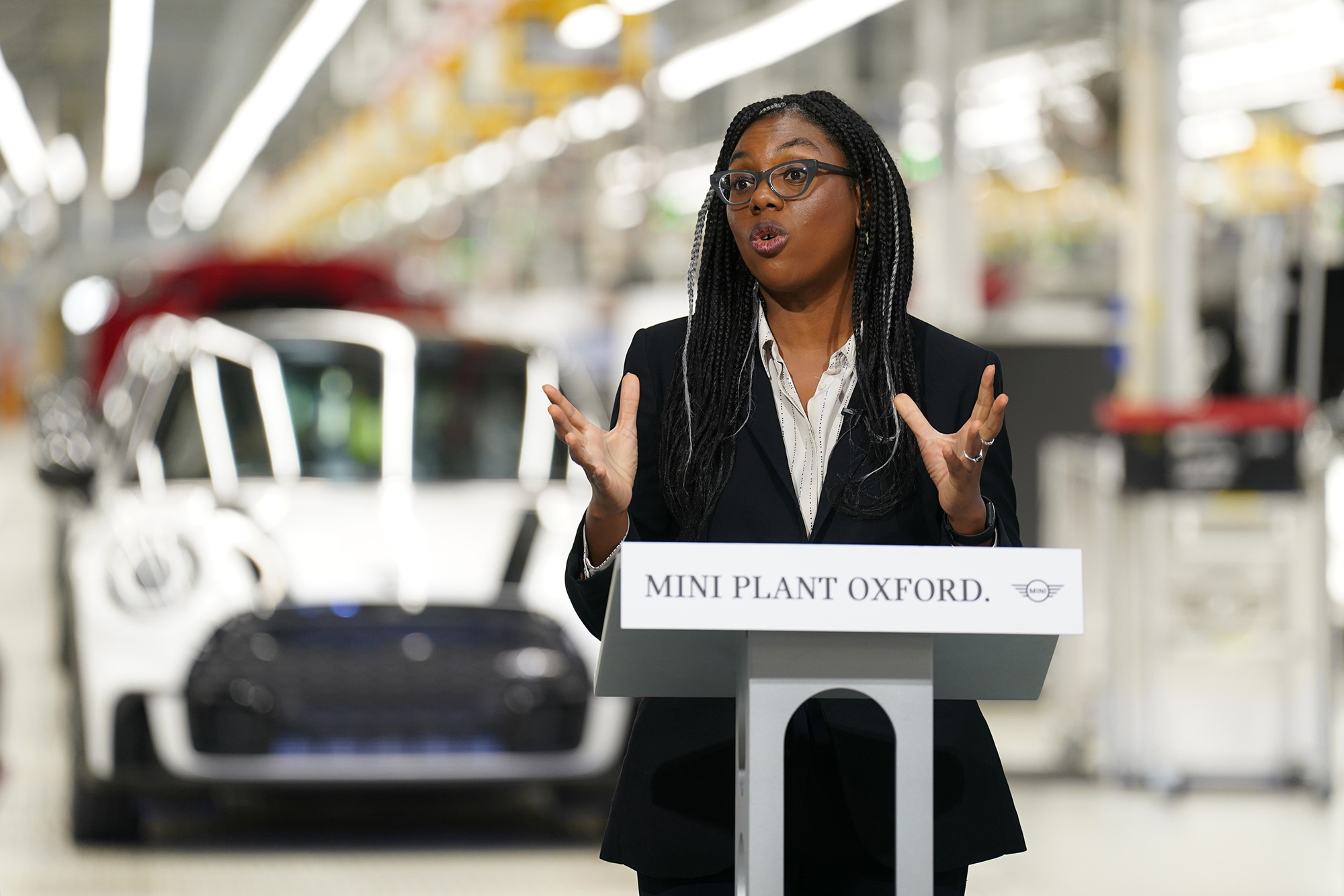BMW is to plough £600m into its UK Mini factories to build new electric cars after securing government funding, it was announced today.
The German manufacturer said the money will enable the Cowley plant in Oxford to produce two new electric Mini models, starting in 2026.
Business secretary Kemi Badenoch, who visited the site today, wouldn’t comment on speculation that the taxpayer-funded support – which will come from the Automotive Transformation Fund – was worth £75m.
The investments will help to secure 4,000 jobs at the Oxford and Swindon plants.
Badenoch told reporters: ‘I won’t comment on the figure because that creates difficulties in future negotiations.
‘What I will say is that we do provide some subsidy, very light subsidy, in the auto industry because it faces so much difficulty, and some of that is regulatory.’
She said car manufacturing around the world was ‘not a pure free trade market’ so ‘we have to think very carefully about which industries you want in the UK’.
Addressing Badenoch in a speech at the Cowley plant, BMW Group board member responsible for production Milan Nedeljković, said: ‘Without your support, this transformation would not be possible. This was the right move at the right time.’
BMW said it will invest £600m at the Oxford site and another Mini factory in Swindon, where vehicle body panels are made.
Its investment will transform the Cowley plant to all-electric production from 2030, with the UK manufacture of two new electrified models – Mini Cooper and Mini Aceman – starting in 2026.
Earlier, Nedeljković said: ‘With this new investment we will develop the Oxford plant for production of the new generation of electric Minis and set the path for purely electric car manufacturing in the future.’
Stefanie Wurst, head of the Mini brand, said: ‘Mini has always been aware of its history – Oxford is and remains the heart of the brand.
‘I am delighted that the two new, fully electric Mini models – the Mini Cooper and Mini Aceman – are also being produced in Oxford, thereby confirming our path to a fully electric future.
‘The continuing high demand for our locally emission-free vehicles shows the openness of the global Mini community to electromobility, which we will be able to serve optimally in the future, also thanks to Oxford.’
The existing production lines at Cowley will be developed further, with the key changes being an extension of the current body shop and a new area for battery installation.
Additional logistics facilities will be built on both the Oxford and Swindon sites.
Markus Grüneisl, CEO of the Oxford and Swindon factories, said: ‘I am proud to say that our Oxford and Swindon plants will play a central role in the BMW Group’s transition to electromobility.
‘We are determined to continue the historic success story of our plants, producing the most loved British car brand.’
Rishi Sunak said the government was securing jobs and boosting the economy ‘by backing our car manufacturing industry’.

Kemi Badenoch at the Oxford Mini site today (Image: Joe Giddens/PA)
The PM added: ‘BMW’s investment is another shining example of how the UK is the best place to build cars of the future.’
It’s the latest boost for the British car industry, after latest figures showed production rose by almost a third in July versus a year ago.
The SMMT said it showed that carmakers were continuing their recovery from recent difficulties, including global chip shortages.
SMMT chief executive Mike Hawes said today: ‘BMW’s landmark announcement is yet another vote of confidence in UK automotive manufacturing.
‘Not only does it secure the long-term future of the home of one of the world’s most iconic brands, it also demonstrates once again our capabilities in electric vehicle production.
‘British automotive manufacturing has clear advantages: a skilled, highly productive workforce, cutting-edge plants, a diverse vibrant supply chain and world-class R&D – all of which we must continue to promote in the face of fierce global competition.
‘Investments such as this improve productivity and help deliver jobs, growth and economic benefits for the country.’
Last week, electric van production began at the Stellantis factory in Ellesmere Port after a £100m investment, following doubts because of post-Brexit trading arrangements.
Vehicles such as the Vauxhall Combo Electric, Opel Combo Electric, Peugeot e-Partner, Citroen e-Berlingo and Fiat E-Doblo will be made at the Cheshire site.
Chancellor Jeremy Hunt said BMW’s investment was a ‘huge vote of confidence in this country as a global leader in electric vehicles’.
Business and trade secretary Kemi Badenoch said it demonstrated that ‘the government’s plan for the automotive sector is working’.
Car makers have urged the European Union to delay post-Brexit trade rules that will lead to tariffs on exports of many UK-built cars, particularly electric models.
The bloc’s rules of origin provision is due to come into force in January 2024.
Asked about the progress of discussions over the issue with the EU, Badenoch told reporters today this is ‘something that we have been raising with the EU for a very long time’.
She said putting tariffs on each other’s products ‘will only benefit Chinese companies’ – where many electric vehicle batteries are made.
‘We need to make sure that the rules work for today, not for five years ago when we were drawing them up together, and I’ve made that very clear to my counterparts, and their industries, I think, are screaming at the EU so hopefully we can get something positive,’ she added.
‘But if not, the UK government is very, very behind the auto industry, as we’ve shown with all the series of announcements, and we will have another plan.’
Pictured at top via PA: Mini cars on the production line in Oxford
Story originally published at 9.05am on September 11, updated at 11.44am with confirmation of the investment by BMW plus SMMT statement, and further updated at 1.45pm with comments from Kemi Badenoch and BMW


































